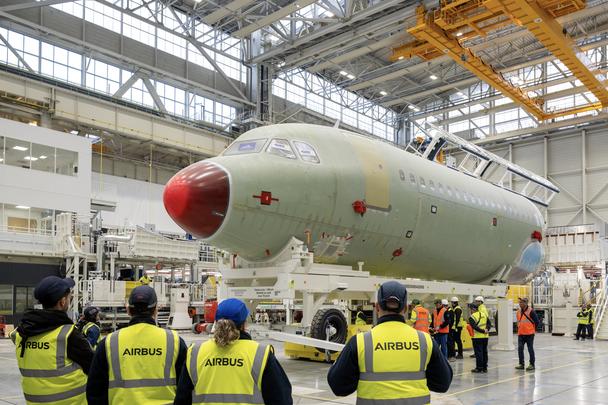Airbus, the aviation giant, is feeling the squeeze. With ambitious plans to ramp up passenger jet production, the company is now grappling with persistent parts and labor shortages, industry insiders revealed on Thursday. The impact? A potential slowdown that could ripple through the rest of 2024.
The exact consequences of this production hitch are still unfolding. While it’s uncertain whether Airbus’s goal of delivering 800 airplanes this year is at risk, there’s a clear sign of trouble. Several dozen jets could face assembly delays in the latter half of the year, sources confided. Already, airlines are experiencing delays averaging 1.5 months per delivery, and this hiccup might extend that wait.
Looking ahead, Airbus is aiming high: boosting the production of narrowbody planes by around 50%, reaching 75 units monthly by 2026. Yet, insiders caution that the room for error is diminishing, even as the company hopes to catch up on delays to hit these ambitious targets.
The complexity of Airbus’s supply chain, which accounts for up to 80% of its jet components and extends through nine tiers, adds to the challenge. Legal documents from a 2022 dispute with Qatar Airways and confidential conversations with insiders paint a picture of a delicate, intricate operation.
Airbus conducts monthly meetings to align production with long-term demand. Parts for standard narrowbody models like the popular A321neo are typically ordered over a year in advance. However, the lead time for some critical parts, such as forgings, has ballooned to nearly two years. Custom seat supplies for wide-body aircraft remain a stumbling block, further complicating delivery schedules.
Suppliers report that Airbus’s frequent last-minute adjustments to production requests, known as “call-offs,” are signaling more delays down the line. This internal shuffle is casting a shadow over the aviation industry’s high-profile annual summit in Dubai, where airline executives are expected to voice their concerns over ongoing plane shortages for a second consecutive year.
Yet, amidst these challenges, there’s a silver lining. Airbus is gaining confidence in securing the long-awaited certification for its A321XLR passenger jet. Industry sources hint that this milestone could be achieved in time for the Farnborough Airshow in July. The European Union Aviation Safety Agency (EASA) anticipates certification by summer, though it stopped short of specifying an exact date.
In the world of aviation, Airbus’s journey reflects a broader industry struggle: balancing ambitious growth with the harsh realities of a strained supply chain. As the year progresses, all eyes will be on Airbus to see if they can navigate these turbulent skies.
(Source: MSN | Benzinga)









